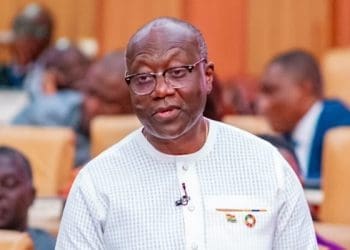Parliament has approved Justice Paul Baffoe-Bonnie as the new Chief Justice of the Republic of Ghana following a unanimous endorsement by members of the House on Thursday, November 13, 2025, following a headcount.
The majority had 163, and the minority had 69 after the headcount.
Justice Baffoe-Bonnie, who has served on the Supreme Court since 2012, was nominated by President John Dramani Mahama to succeed Chief Justice Gertrude Torkornoo, who was removed from office in accordance with Article 146(9) of the 1992 Constitution.
This follows receipt of the report of the Committee constituted under Article 146(6) to inquire into a petition submitted by a Ghanaian citizen, Daniel Ofori.
After considering the petition and the evidence, the Committee found that the grounds of stated misbehaviour under Article 146(1) had been established and recommended her removal from office.
Justice Baffoe-Bonnie’s appointment followed a rigorous vetting process by the Appointments Committee of Parliament, where he responded to questions on judicial reforms, case backlogs, access to justice, and judicial independence.
During the vetting, Justice Baffoe-Bonnie pledged to prioritise efficiency within the judicial system, strengthen ethical standards among judges, and ensure the timely delivery of justice across all courts.
He also emphasised the need for increased digitisation of court processes to improve transparency and public confidence in the judiciary.
The Majority Leader, Mahama Ayariga, in supporting his approval, described Justice Baffoe-Bonnie as a distinguished jurist whose long service on the bench and commitment to justice make him an ideal choice to lead the judiciary.
With his approval by Parliament, Justice Baffoe-Bonnie is expected to be sworn in by President John Dramani Mahama at the presidency in the coming days.
Justice Paul Baffoe-Bonnie brings to the role over three decades of judicial experience, having previously served as a High Court and Court of Appeal judge before his elevation to the Supreme Court.
His appointment marks a new chapter in Ghana’s judicial leadership, with expectations high for continued reforms, accountability, and efficient justice delivery.











